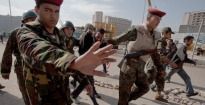Is Egypt's Army Turning Against Revolution?
 Eric Trager writes at The Atlantic:
Eric Trager writes at The Atlantic:
The bands of thugs that had roamed these streets barely three weeks earlier were only a memory on Friday, replaced by roving face-painters, souvenir salesmen, and food vendors. Tahrir Square had become a patriotic carnival, with parents bringing their children for flag-waving Kodak moments, nationalist chants, and cotton candy. Twenty- and thirty-somethings strolled about in "January 25th" t-shirts while the older folks stood in circles debating the country's future. These public political parleys are still novelties, and the people of Tahrir Square were reveling in them.
"In forty years of political activism, I never sat next to Muslim Brothers, except here," said Hany Enan, a founder of the left-wing Kefaya opposition movement, in awe. "I'm a secularist, and I used to hate them."
But Friday night brought the stark reminder that Egypt's revolt is not yet a revolution. After midnight and without warning, masked military police officers attacked a group of protesters who had gathered peacefully outside the People's Assembly, just three blocks south of Tahrir Square. A high-ranking officer reportedly ordered his subordinates to surround the protesters, whom the military police attacked with Tasers and the blunt ends of their weapons.
"I was there because I trusted that the army would not violate its responsibilities," said Khaled Haall, a programming engineer who has been active in the demonstrations. "Because of this, I have lost my faith in the army."
Until now, the military has been lauded as a hero of the public uprising against former President Hosni Mubarak's rule. "Al-shaab wa'al-gaysh eed wahdah" -- "the people and the army are one hand" -- was a common refrain during the demonstrations, and many protesters recognize that internal military pressure ultimately forced Mubarak's resignation.
But since taking control of Egypt on February 11, the Supreme Military Council has emphasized its desire to return things to a state of normalcy for the sake of the country and the economy. The regular demonstrations that continue to cut off -- if not shut down -- major urban thoroughfares do not fit with that plan.
To avoid direct confrontation with protesters, the military has taken a page from Mubarak's playbook and used the state-run media, which it now controls, to appeal to the broader Egyptian public. On Saturday morning, two state-run channels set up cameras along the Nile Corniche, where soldiers arranged individuals to complain about the country's troubles and request the government's intervention. On Channel 2, a man discussed the economic consequences of plummeting tourism, while another asked for the return of the police. On Channel 3, a blind man was filmed asking for services, saying that he needed a job and a home. Just off camera, four large tanks closed the road to traffic, and soldiers brandishing AK-47s lined the street next to the supposedly defunct Ministry of Information. There would be no interference with this carefully crafted media campaign and, after asking the cameramen too many questions, a soldier led me away.
Click here to read more.

